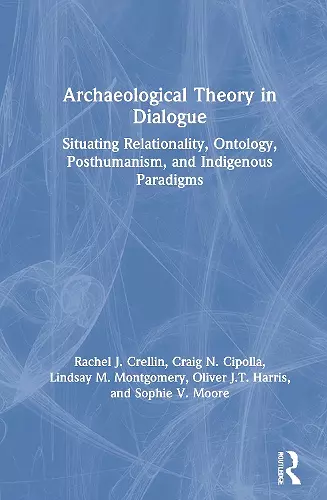Archaeological Theory in Dialogue
Situating Relationality, Ontology, Posthumanism, and Indigenous Paradigms
Craig N Cipolla author Rachel J Crellin author Oliver JT Harris author Lindsay M Montgomery author Sophie V Moore author
Format:Hardback
Publisher:Taylor & Francis Ltd
Published:9th Nov '20
Currently unavailable, and unfortunately no date known when it will be back
This hardback is available in another edition too:
- Paperback£39.99(9780367135478)

Archaeological Theory in Dialogue presents an innovative conversation between five scholars from different backgrounds on a range of central issues facing archaeology today.
Interspersing detailed investigations of critical theoretical issues with dialogues between the authors, the book interrogates the importance of four themes at the heart of much contemporary theoretical debate: relations, ontology, posthumanism, and Indigenous paradigms. The authors, who work in Europe and North America, explore how these themes are shaping the ways that archaeologists conduct fieldwork, conceptualize the past, and engage with the political and ethical challenges that our discipline faces in the twenty-first century.
The unique style of Archaeological Theory in Dialogue, switching between detailed arguments and dialogical exchange, makes it essential reading for both scholars and students of archaeological theory and those with an interest in the politics and ethics of the past.
"If you thought archeology is simply the study of dusty or buried objects and fragments to offer explanations of how past people lived, this book will very quickly dismantle your misconception. Claimed by the social sciences and the humanities, and using techniques and knowledge from the natural sciences, archeology is a transdiscipline if there ever was one. This book shows that the field of archeology itself with its various theories and practices is as vibrant and dynamic as the world it investigates. Archeology unveils worldviews that can make us reflect on how we exist in this contemporary world but its unveiling is a creative and generative gesture as well, infusing one’s ontology into one’s reading of the past. The insightful reflections on ontology, metaontology, realism, decolonization, epistemology, and other ways of knowing presented in this book move archaology to the realm of postdisciplinarity, as championed by posthumanism. The present inquiry adopts a posthumanist feminist materialist stance with a respectful and engaging approach to Indigenous paradigms and thinks through objects and traces of the past while giving them agency and recognizing the vibrancy of being. Importantly, it also rejects the notion of universal subject inherited from centuries of Humanist thinking and thereby expands care and interest to the many who have been othered through it – be they human (women, non-western, Indigenous humans) or nonhuman, objects, plants, etc. This dialogical study thus challenges traditionally held views that rest on privilege and false universalizations and thereby demonstrates that the practice and theorizing at work in the vibrant field of archeology have deep ethical and political impact. Indeed, how we think the past – distant or not so distant – shapes both our present and our future. It is a transformative and essential read, no matter what the disciplinary orientation of its reader." – Professor Christine Daigle, Brock University, Canada
"This is an exciting book. It immerses us in all the most captivating and dynamic conversations going on within archaeology right now, and between archaeologists and their (human and nonhuman) interlocutors. It takes on four of the most important paradigms being debated right now – relations, ontology, posthumanism, and Indigenous – and it does so in a dialogic, interactive format of collective authorship that practices what it preaches. I can’t wait to give this book to my students!" – Professor Mary Weismantel, Northwestern University, USA
"Archaeological Theory in Dialogue provides vivid evidence of the health and richness of archaeological thinking. This is neither a manifesto for a self-proclaimed new paradigm, nor a set of unrelated papers, but a genuine engagement between scholars who exchange views on a series of issues of agreed importance to the continuing development of the discipline. The volume coheres around the themes of relationality, ontology, posthumanism, and indigenous perspectives, but the philosophical resources drawn on to address these topics range from the new materialisms, Deleuzian assemblage theory and actor network theory, to phenomenology and Indigenous philosophy, while the continuing significance of the Marxian tradition is also considered. In the process, the authors confront the problems of flat ontologies and anthropocentrism, experience and affect, while attempting to draw our attention back to questions of power, social justice, social responsibility, and the recognition of minoritarian and subaltern perspectives. The pressing nature of these debates, and the democratic spirit in which they are conducted makes this a vital and engaging contribution." – Professor Julian Thomas, University of Manchester, UK
ISBN: 9780367135454
Dimensions: unknown
Weight: 560g
236 pages